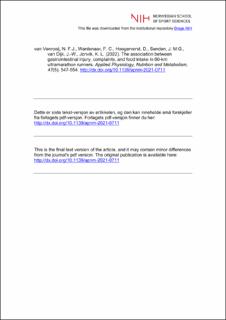The association between gastrointestinal injury, complaints, and food intake in 60-km ultramarathon runners
van Venrooij, Niek F.J.; Wardenaar, Floris C.; Hoogervorst, Daan; Senden, Joan M.G.; van Dijk, Jan-Willem; Jonvik, Kristin Lundanes
Peer reviewed, Journal article
Accepted version
Permanent lenke
https://hdl.handle.net/11250/3036057Utgivelsesdato
2022Metadata
Vis full innførselSamlinger
- Artikler / Articles [2119]
- Publikasjoner fra Cristin [1107]
Originalversjon
Applied Physiology, Nutrition and Metabolism. 2022, 47(5), 547-554. 10.1139/apnm-2021-0711Sammendrag
We aimed to assess the association between gastrointestinal (GI) injury, complaints, and food intake in 60-km ultramarathon runners. Thirty-three ultramarathon runners provided pre- and post-race blood samples for assessment of GI injury by intestinal fatty-acid binding protein (I-FABP), and inflammatory response by interleukin (IL)-6, IL-8, tumour necrosis factor alpha (TNF-α), and C-reactive protein (CRP). GI complaints and nutritional intake were reported by a post-race questionnaire. GI complaints were reported by 73% of the runners, of which 20% reported 1 or 2 severe complaints. IL-6, IL8, TNF-α, and CRP increased significantly from pre- to post-race (P < 0.001 for all biomarkers), while I-FABP did not (1375 [IQR: 1264–2073] to 1726 [IQR: 985–3287] pg/mL; P = 0.330). The ‘GI complaints score’, as the integral of the number and severity of GI complaints, did not correlate with ΔI-FABP (rs: –0.050, P = 0.790) or energy intake (rs: 0.211, P = 0.260). However, there was a significant negative correlation between energy intake and ΔI-FABP (rs: –0.388, P = 0.031). In conclusion, GI complaints were neither associated with food intake nor GI injury as assessed by plasma I-FABP response. Energy intake, however, was inversely related to the I-FABP response to exercise. This finding suggests that substantial energy intakes during exercise may prevent exercise-induced GI injury as assessed by the I-FABP response.
Novelty:
No association between gastrointestinal complaints and gastrointestinal injury (I-FABP response) or food intake was present.
There was an inverse correlation between energy intake and plasma I-FABP response, suggesting that higher energy intakes may prevent gastrointestinal injury as assessed by the I-FABP response.
Beskrivelse
I Brage finner du siste tekst-versjon av artikkelen, og den kan inneholde ubetydelige forskjeller fra forlagets pdf-versjon. Forlagets pdf-versjon finner du på www.cdnsciencepub.com / In Brage you'll find the final text version of the article, and it may contain insignificant differences from the journal's pdf version. The original publication is available at www.cdnsciencepub.com
